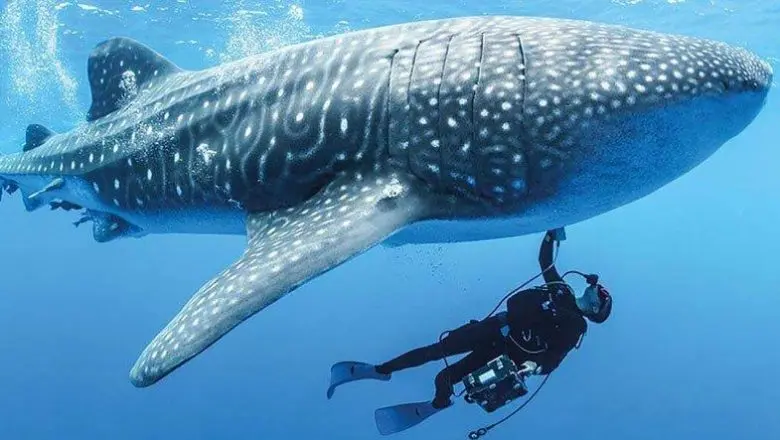Quite against the contrary, the giant shark found in the oceans is not a full-time predator. It’s called a Whale shark and is happy to feed on filters and tiny fish like krill, devouring photosynthetic algae along the way.
The question of whether this sort of green food is sufficient for the Whale shark or whether it’s just an appetizer has scientists perplexed.
Researchers at the University of Tasmania scrutinized these large sharks’ excretions to find that the sharks were consuming krill. Still, much of it wasn’t being used for the benefit of their body. Whale sharks were obtaining a lot of nutrients from algae instead.
In Australia’s Institute of Marine Science, experts claimed to have proved that these sharks were omnivorous rather than pure carnivorous by fatty acid profile analysis of tissues. Finding abundant arachidonic acid in the skin tissue matched the high quantities of this fatty acid in the floating microalgae Sargassam in the oceans.
Later studies demonstrated that whale sharks ate several species of microfungi and plants that construct the food chain’s base. Other sharks like bonnetheads also have a taste for plants and algae and are found to eat seagrass. They inevitably gobble it up while catching small animals for prey like crabs, mollusks, and fish and have adapted to digest it.
Scientists seem to think a similar scenario also o happened with the whale sharks. Upon hunting the animals that live on algae, they have been chucking a lot of algae, adapted to digest it, and using the nutrients for their sustainability.
There is a disadvantage to feasting on everything that comes your way, though. Some plastics were also observed in the fecal matter of these sharks. These microplastics pollute ocean currents and are ingested by the sharks and the microflora, causing their metabolism to decrease and become dysfunctional. Whale sharks are already endangered animals, and their population has declined by an astounding 62 percent in the previous 75 years.
According to a surprising observation, giant land animals have always been herbivorous, like camels and elephants. It’s no different in the underwater world; these sharks are about six to ten meters long, but they still prefer a ‘little salad’ for a vegetarian touch along with their meat.

Aniqa Mazhar is a graduate of QAU in Biochemistry. She has taught sciences to O levels and is currently planning for her MS in Food Technology. Aniqa’s hobbies are reading, watching movies, writing, calligraphy, long walks, and nature photography.

